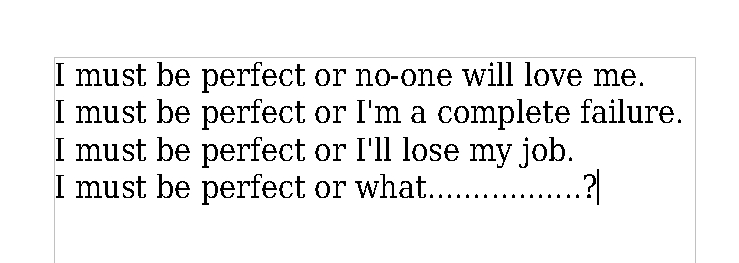

I once had an employee spend an entire eight-hour work day drawing a single line.
The line, an illustration in a training manual, depicted a cable TV wire hanging between two poles. "The curve of the drop in the line is perfect in every possible scientific calculation," he delightedly informed me. "I’m pleased and exhausted, ready to call it a day."
No doubt about it, he was the poster child for author Don E. Hamachek's defintion of a perfectionist: "Someone who can derive a very real sense of pleasure from the labors of a painstaking effort."
Perfectionism can drive one to heights of achievement—or to the depths of despair and inaction. Perfectionism demands that you and your work be flawless because anything else is unacceptable. It's all black and white: either you're perfect or you're a failure. Perfectionism is a learned attitude that’s very different from working to achieve excellence.

"There's a difference between excellence and perfection," says Miriam Adderholdt, author of Perfectionism: What's Bad About Being Too Good? “Excellence involves enjoying what you're doing, feeling good about what you've learned, and developing confidence. Perfection involves…always finding mistakes no matter how well you're doing.”
The pursuit of excellence requires effort and focus. Yet, unlike perfectionism, it doesn’t demand a sacrifice of self-esteem because the focus is on the process of achievement rather than the outcome.
To aim for excellence (which is within your grasp) rather than striving for perfection (a recipe for heartache):
Come to terms with how intimidating perfectionism is to others and how personally exhausting it is. No one is 100% perfect all the time in everything they do (not even the 49,500 people who searched perfectionism on Google last month!). It's a state that’s impossible to attain or maintain. Avoid aiming for perfection. Instead, reframe your thinking, reclaim your confidence, and go for excellence instead.
And, if you’re thinking that you might have a perfectionist quality or two, there’s a fun little assessment at Discovery Health that you might want to check out.
What experiences about escaping perfectionism have you had?
Image credit: Belongs to Kent; top image http://baneofyourresistance.files.wordpress.com